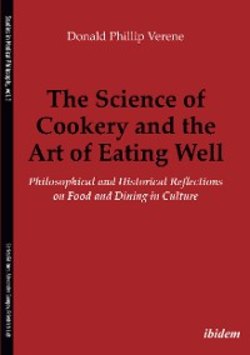Читать книгу The Science of Cookery and the Art of Eating Well - Donald Phillip Verene - Страница 6
Preface
ОглавлениеIn the second chapter of Ecclesiastes, the wisdom of Solomon is: “There is nothing better for mortals than to eat and drink, and find enjoyment in their toil.” Two things distinctive to human culture are the development of language and the cooking of food. These two abilities come together in the art of dining. The meal unites food and conversation. The pleasures of the table and of table-talk go back as far as the poems of Homer.
The science of cookery and the art of eating well are not medicine, but they are allied with medicine from its earliest conception. Galen, in discussing the importance of nutrition in the Method of Medicine, says: “In short, the chief point of nourishment is to let it be easily digested and nutritious” (7.6). Medicine is directly concerned with the prevention and healing of disease. In its broader sense, it is concerned with the well-being of human beings. In this concern, cooking and eating well play a role. Proper nutrition is essential to the health of the body and the conviviality of the meal and the institution of dining is of great value for promoting the tranquility of the psyche.
The theme of this book is the importance of home cooking and how it depends upon and maintains tradition. The art of eating well is enhanced by a knowledge of ingredients and an awareness of the history of dining. Such knowledge gives context to the daily event of the meal, an event that is present in every culture and as old as culture itself. The art of dining, like the art of living of which it is a part, is a way to order the self and its place in the world.
Chapter 1 is a general view of cooking and dining, as begun by the ancient Greeks and Romans, and progressing to the famous text of Brillat-Savarin, The Physiology of Taste. Chapter 2 is an interpretation of Plutarch’s Dinner of the Seven Wise Men, his imaginative account of the gathering at Delphi of the Seven Sages of Greece, at a dinner hosted by Periander, ruler of Corinth, whose conversation encompasses the nature of good government and the nature of the human soul. Chapter 3 is a condensation of the fifteen books of Athenaeus’s treatise on the Learned Banqueters or Deipnosophists, a work which cites many other works, and which is itself frequently cited but rarely read. Chapter 4 discusses the two most famous cookbooks in Western culture: the Roman work of Apicius and the Florentine book of Artusi. Added to these are comments on some contemporary cookbooks, notably those of Giuliano Bugialli.
The theme of this book derives from my experience with and attachment to Italian cooking, acquired while living for extended periods in Florence over the past several decades. To shop at the Mercato Centrale at San Lorenzo is to confront a world of ingredients necessary to the Florentine table. When combined with the friendly conversations with its vendors, concerning the preparation of their wares, such shopping is a culinary education that no cookbook can supply. In Florentine cooking, as in Italian cooking generally, the quality of the ingredients, including their freshness, is the master key to the art of eating well.
It is only human to desire to eat well. But I find a more specific reason in the words of the great poet of the American language, author of the epic poem The People, Yes, Carl Sandburg, who was born and raised in the midwestern town of Galesburg, Illinois—as was I. Sandburg was asked what he wanted out of life. He replied, “Three things, maybe four: to be out of jail, to eat regular, to get what I write printed. And a little love at home and a little outside.” The fourth was his way of expressing his wish to receive some recognition for his work, but he knew what every writer knows—that the recognition may not come. That’s why it’s important to eat regular.
Once again, I thank Molly Black Verene for her necessary and generous assistance in the preparation of the text.
